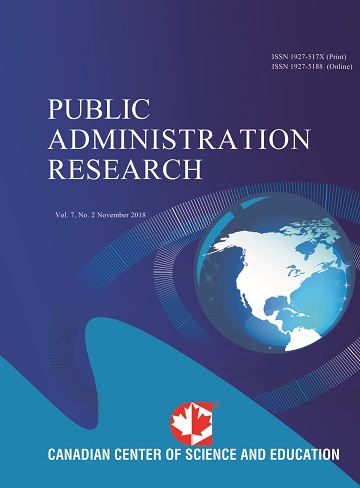Public Administration and Minority Language: The Case of District Administration in Amparai, Sri Lanka
- Mohammad Agus Yusoff
- Athambawa Sarjoon
- Nordin Hussin
- Azmi Awang
Abstract
Even though minorities have gained international linguistic recognition, accepting and admitting minority languages in public affairs has been a contested issue in many countries. In Sri Lanka, the admitting of minority language — specifically Tamil — in public administration has continued to be a serious issue imposing a number of difficulties on Tamil-speaking minorities, although Tamil is legally recognized as an official language. The district administration of Amparai in the eastern province is a severe case where Tamil has been marginalized in the district’s administrative affairs, violating the constitutional recognition of conducting public administration in Tamil in the north-eastern region. The major objective of this study is to examine the nature and extent of Tamil language admission in the district administration of Amparai. The findings of this study revealed that the violation of constitutional provisions and administrative circulars on admitting the Tamil language in district administration has not only led to the domination of the Sinhala language and the Sinhalese in this district’s administration, but also has induced the Tamil-speakers of this district to demand and advocate for a new administrative district within the district for their administrative easiness. This research suggests that proper implementation of Tamil language provisions and institutional restructuring at the district secretariat level would help to reconcile the linguistic issues facing by Tamil-speakers in the district. This case study incorporates both primary and secondary data collected from different sources, and is presented through descriptive and interpretative analysis.- Full Text:
 PDF
PDF
- DOI:10.5539/par.v4n2p31
Journal Metrics
h-index (2017): 7
i10-index (2017): 6
h5-index (2017): 7
h5-median (2017): 13
Index
- COPAC
- CrossRef
- DTU Library
- EBSCOhost
- EuroPub Database
- Excellence in Research for Australia (ERA)
- Genamics JournalSeek
- Ghent University Library
- Google Scholar
- Harvard Library
- Infotrieve
- Jisc Library Hub Discover
- LOCKSS
- Mir@bel
- Norwegian Centre for Research Data (NSD)
- Open J-Gate
- PKP Open Archives Harvester
- Publons
- ROAD
- Scilit
- SHERPA/RoMEO
- Stanford Libraries
- Ulrich's
- UniCat
- Universe Digital Library
- UoS Library
- WorldCat
Contact
- Gabriel TaiEditorial Assistant
- par@ccsenet.org
